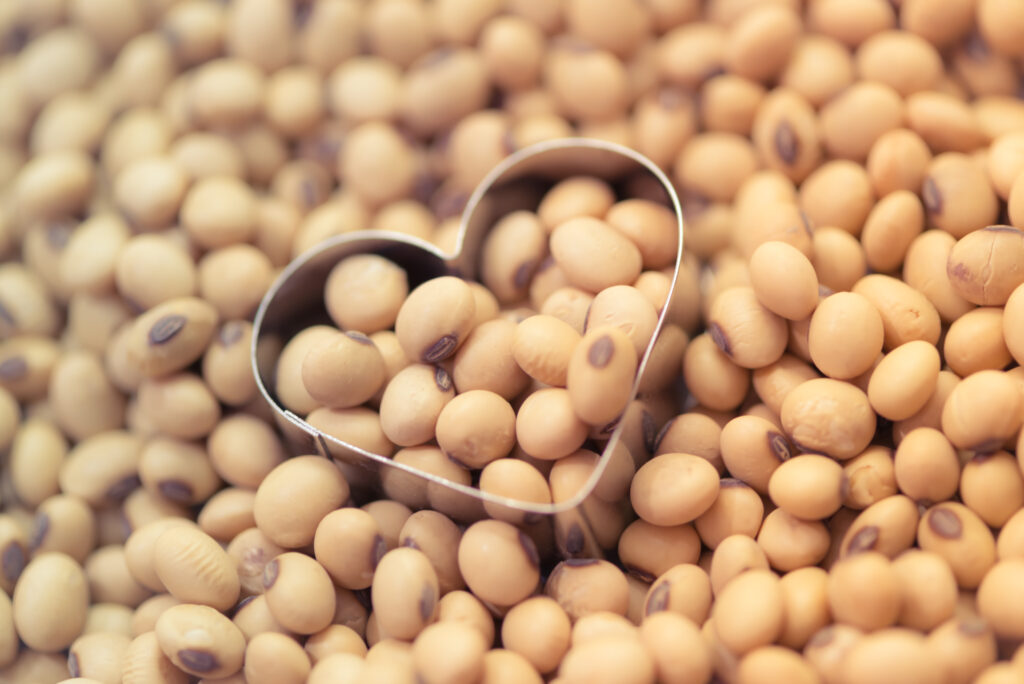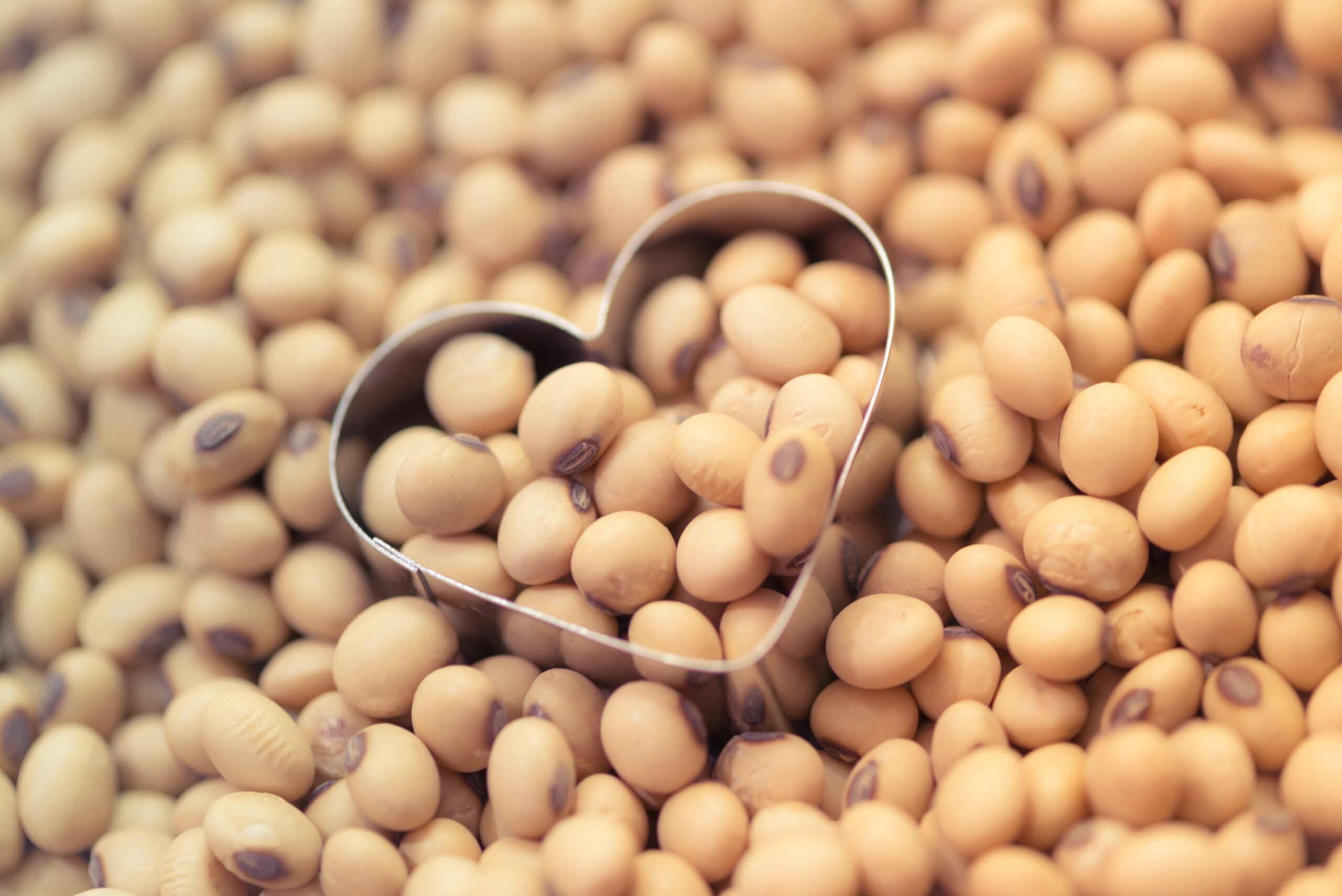Is soy good or bad for heart health? In this article, we will dive into what soy does in the body and what the research says about it.
Soy is the term used to describe products made from the soybean or soya bean. Soybeans are a legume and a complete protein, which is a protein that contains all nine essential amino acids in amounts needed by the body. A wide array of foods – including protein and oil options – are made from soybeans. These products can be a source of high-quality protein, fiber, and other nutrients.
Soy protein directly lowers blood cholesterol levels. Numerous meta-analyses published over the past 15 years indicate the reduction in LDL-cholesterol is approximately 4%. Over a period of years, each 1% reduction in cholesterol is thought to reduce risk of coronary heart disease by approximately 1-2%.
In 1999, the U.S. Food and Drug Administration approved a health claim for soy foods and coronary heart disease based on the cholesterol-lowering effects of soy protein. At least 12 countries have approved similar claims over the past 20 years; the most recent country to do so was Canada, which approved a claim in 2015.
It is important to note that research indicates various components of the soybean can help to decrease high blood pressure in individuals with hypertension and reduce LDL cholesterol in people with high cholesterol levels.

Nutrients
Soybeans are nutrient-rich and contain many important nutrients that provide heart-healthy benefits. Soy foods have several nutrients, including folate, potassium, zinc, and magnesium:
- Folate: Folate can protect the heart because it is one of the B vitamins that helps break down homocysteine levels in the body. When folate is not adequately consumed, it can increase homocysteine levels which is associated with heart disease.
- 1 cup of cooked mature soybeans has 92.9 mcg of folate, which is 23% of the Daily Value (DV).
- 1 cup of edamame has 482 mcg of folate, which is 120% DV.
- ¼ block of firm tofu has 23.5 mcg of folate, which is 5.9% DV.
- 1 cup soymilk has 24.3 mcg of folate
- 1 cup of tempeh has 39.8 mcg of folate, which is 10% DV.
- 4 oz soy-based burger has 80.2 mcg of folate
- Potassium: Potassium can protect the heart because it helps maintain heartbeat regularity and helps to normalize blood pressure. In this systemic review and meta-analysis of 22 randomized controlled trials and 11 cohort studies, increased potassium lowered the incidence of stroke by 24%.
- 1 cup of cooked mature soybean has 886 mg of potassium, which is 19% DV.
- 1 cup of edamame has 676 mg of potassium, which is 14% DV.
- 4 oz soy-based burger has 699 mg of potassium
- ¼ block of firm tofu has 192 mg of potassium, which is 4% DV.
- 1 cup soymilk has 299 mg of potassium
- 1 cup of tempeh has 684 mg of potassium, which is 14.5% DV.
- Zinc: Because of its antioxidant and anti-inflammatory components, zinc is one of the nutrients that can help mitigate a common mechanism contributing to atherosclerosis. One of the main causes of atherosclerosis, the major cause of heart disease, is oxidative stress because it can lead to blood vessel damage and oxidation of LDL cholesterol.
- 1 cup of cooked mature soybeans has 1.98 mg of zinc which is 18% DV.
- ½ cup of black soybeans has 2.25 mg of zinc, which is 15% DV
- 1 cup of edamame has 2.12 mg of zinc which is 19% DV.
- ¼ block of firm tofu has 1.27 mg of zinc which is 11.5% DV.
- 1 cup of tempeh has 1.89 mg of zinc which is 17.2% DV.
- Magnesium: Magnesium is an essential mineral that is involved in more than 300 enzymatic reactions that helps blood pressure regulation, blood sugar control, lipid oxidation, and antioxidant pathways. Magnesium is an important nutrient for cardiovascular health and magnesium deficiency has been linked to high blood pressure, cardiomyopathy, heartbeat irregularities, atherosclerosis, abnormal lipid values, and diabetes.
- ½ cup of black soybeans has 59.8 mg of magnesium, 15% DV.
- 1 cup of edamame has 99.2mg of magnesium which is 23.6% DV.
- ¼ block of firm tofu has 47mg of magnesium which is 11.2% DV.
- 1 cup of tempeh has 134mg of magnesium which is 32% DV.
Soy foods also contain, in varying amounts based on product, both insoluble and soluble fiber, which is beneficial for heart health. In this systemic review and meta-analysis, higher dietary fiber intakes have been shown to reduce the risk of cardiovascular disease, and lower certain heart disease risk factors such as high blood pressure, cholesterol, and body weight.
Phytochemicals
Phytochemicals, such as isoflavones and phytosterols, can also play a role in heart health. Soy is a uniquely rich source of isoflavones. Traditional soy foods contain approximately 3.5 mg of isoflavones per gram of protein or between 20-30 mg per serving.
Isoflavones may help lower blood pressure by helping the arteries relax and dilate. Soy isoflavones have been shown to help increase endogenous nitric oxide production, which improves blood flow. In this meta-analysis, daily intake of 65-153 mg of soy isoflavones for 1-12 months significantly decreased blood pressure (on average by 5.94 mmHg systolic and 3.35 mmHg diastolic) in individuals with high blood pressure.
Research shows that soy may help reduce stiffness in the arteries in certain individuals who can metabolize daidzein, a specific isoflavone that is only found in soy foods, into equol. When the body produces equol as a metabolite from soybean production, it has been shown to improve blood vessel function, blood pressure, and arterial stiffness.
When soy foods are digested in the body, the gut produces short-chain fatty acids like butyrate. Butyrate provides anti-inflammatory, antioxidant, and possibly even protective effects on atherosclerosis by reducing inflammation and oxidative stress, the underlying root causes of the plaque formation process.
Soybean Oil
The U.S. Food and Drug Administration has recognized soybean oil for its cardiovascular health benefits with a qualified health claim. The language allowed in support of the soybean oil health claim is stronger than the language for others that have similar health claims.
“The soybean oil health claim states: Supportive but not conclusive scientific evidence suggests that eating about 1½ tablespoons (20.5 grams) daily of soybean oil, which contains unsaturated fat, may reduce the risk of coronary heart disease. To achieve this possible benefit, soybean oil is to replace saturated fat and not increase the total number of calories you eat in a day.”
The Takeaway
In summary, soy foods are a good source of complete protein and may provide cardiovascular benefits from their rich vitamin and mineral content to their dietary fiber and phytochemical makeup. Including edamame, tofu, tempeh, soymilk, and other soy foods in your diet is a great way to reap these benefits and contribute to a heart-healthy diet.
It is important to focus on what you are eating to support optimal heart health. To learn more about heart disease prevention through science based nutrition, sign up to my email list here, and follow me on social media on Instagram at heart.health.nutritionist.
References:
- Carmel R, Green R, Rosenblatt DS, Watkins D. Update on cobalamin, folate, and homocysteine. Hematology Am Soc Hematol Educ Program. 2003:62-81. doi: 10.1182/asheducation-2003.1.62. PMID: 14633777.
- U.S. Department of Agriculture, Agricultural Research Service. FoodData Central, 2019. fdc.nal.usda.gov.
- U.S. Food & Drug Administration. Daily Value on the New Nutrition and Supplement Facts Labels. Updated 2/25/2022. Acessed 5/19/23. https://www.fda.gov/food/new-nutrition-facts-label/daily-value-new-nutrition-and-supplement-facts-labels.
- Aburto NJ, Hanson S, Gutierrez H, Hooper L, Elliott P, Cappuccio FP. Effect of increased potassium intake on cardiovascular risk factors and disease: systematic review and meta-analyses. BMJ. 2013 Apr 3;346:f1378. doi: 10.1136/bmj.f1378. PMID: 23558164; PMCID: PMC4816263.
- Choi S, Liu X, Pan Z. Zinc deficiency and cellular oxidative stress: prognostic implications in cardiovascular diseases. Acta Pharmacol Sin. 2018 Jul;39(7):1120-1132. doi: 10.1038/aps.2018.25. Epub 2018 Jun 21. PMID: 29926844; PMCID: PMC6289396.
- DiNicolantonio JJ, Liu J, O’Keefe JH. Magnesium for the prevention and treatment of cardiovascular disease. Open Heart. 2018 Jul 1;5(2):e000775. doi: 10.1136/openhrt-2018-000775. PMID: 30018772; PMCID: PMC6045762.
- Reynolds AN, Akerman A, Kumar S, Diep Pham HT, Coffey S, Mann J. Dietary fibre in hypertension and cardiovascular disease management: systematic review and meta-analyses. BMC Med. 2022 Apr 22;20(1):139. doi: 10.1186/s12916-022-02328-x. PMID: 35449060; PMCID: PMC9027105.
- Liu XX, Li SH, Chen JZ, Sun K, Wang XJ, Wang XG, Hui RT. Effect of soy isoflavones on blood pressure: a meta-analysis of randomized controlled trials. Nutr Metab Cardiovasc Dis. 2012 Jun;22(6):463-70. doi: 10.1016/j.numecd.2010.09.006. Epub 2011 Feb 9. PMID: 21310599.
- Hügel HM, Jackson N, May B, Zhang AL, Xue CC. Polyphenol protection and treatment of hypertension. Phytomedicine. 2016 Feb 15;23(2):220-31. doi: 10.1016/j.phymed.2015.12.012. Epub 2016 Jan 7. PMID: 26926184.
- Tokede OA, Onabanjo TA, Yansane A, Gaziano JM, Djoussé L. Soya products and serum lipids: a meta-analysis of randomised controlled trials. Br J Nutr. 2015 Sep 28;114(6):831-43. doi: 10.1017/S0007114515002603. Epub 2015 Aug 13. PMID: 26268987.
- Cabral CE, Klein MRST. Phytosterols in the Treatment of Hypercholesterolemia and Prevention of Cardiovascular Diseases. Arq Bras Cardiol. 2017 Nov;109(5):475-482. doi: 10.5935/abc.20170158. PMID: 29267628; PMCID: PMC5729784.
- Ramdath DD, Padhi EM, Sarfaraz S, Renwick S, Duncan AM. Beyond the Cholesterol-Lowering Effect of Soy Protein: A Review of the Effects of Dietary Soy and Its Constituents on Risk Factors for Cardiovascular Disease. Nutrients. 2017 Mar 24;9(4):324. doi: 10.3390/nu9040324. PMID: 28338639; PMCID: PMC5409663.
- Amiri P, Hosseini SA, Ghaffari S, Tutunchi H, Ghaffari S, Mosharkesh E, Asghari S, Roshanravan N. Role of Butyrate, a Gut Microbiota Derived Metabolite, in Cardiovascular Diseases: A comprehensive narrative review. Front Pharmacol. 2022 Feb 2;12:837509. doi: 10.3389/fphar.2021.837509. PMID: 35185553; PMCID: PMC8847574.
This post is in collaboration with the Soy Nutrition Institute (SNI) Global, an organization leading the way in soy and health research and education, and U.S. Soy.
